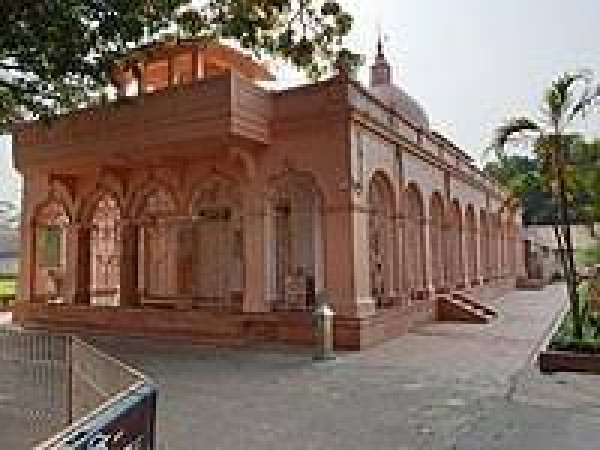
Joyrambati
Duration
1 to 2 Days
1 to 2 Days
Best time to visit
Oct-Feb
Oct-Feb
Theme
Religious
Religious
Joyrambati Travel Guide
Joyrambati is a small town located in the Bankura district of West Bengal, India. This serene town holds great historical and cultural significance as the birthplace of Sri Sarada Devi, the spiritual consort of Sri Ramakrishna Paramahamsa. Joyrambati is famous for its peaceful atmosphere, spiritual vibrations, and the holy temple dedicated to Sri Sarada Devi.Top Attractions in Joyrambati
- Sri Sarada Math - The holy temple dedicated to Sri Sarada Devi
- Joyrambati Monastery - A serene monastery offering spiritual retreats
- Kamarpukur - A nearby village known for being the birthplace of Sri Ramakrishna Paramahamsa
- Pather Dhara - A tranquil spot for meditation and reflection
Joyrambati is Famous for
Spiritual significance and the birthplace of Sri Sarada Devi.Top Attractions in Joyrambati
- Serene atmosphere and spiritual vibrations
- Sri Sarada Math and Joyrambati Monastery
- Kamarpukur and Pather Dhara for spiritual experiences
What's Great about Travelling to Joyrambati?
- Perfect for spiritual seekers and those seeking inner peace
- Serene environment ideal for meditation and relaxation
- Immersion in the teachings and legacy of Sri Sarada Devi
What's Not So Great about Travelling to Joyrambati?
- Limited nightlife and entertainment options
- Not ideal for travelers seeking bustling city life
- Limited accommodation choices
Travel Tips for Joyrambati
- Carry appropriate clothing for temple visits
- Respect local customs and traditions
- Be prepared for simple vegetarian meals
Important Joyrambati trip information
- Ideal Duration: 1-2 days
- Best Time to Visit: October to March for pleasant weather
- Nearby Airports and Railway Stations: The nearest airport is Netaji Subhas Chandra Bose International Airport in Kolkata, and the nearest railway station is Kamarkundu Junction.
FAQ's on Joyrambati
Q1: What is the best time to visit Joyrambati?
The best time to visit Joyrambati is during the winter months from November to February when the weather is pleasant and ideal for exploring the attractions. This period also coincides with various festivals and events in the region, providing a vibrant cultural experience for visitors. Avoid the monsoon season from June to September, as heavy rains can disrupt travel plans.
Q2: Do I need a visa to travel to Joyrambati?
Tourists visiting Joyrambati typically do not require a visa for short stays. However, it is essential to check the specific visa requirements based on your nationality before traveling. Make sure to have a valid passport with at least six months validity beyond your intended stay.
Q3: What are the must-visit attractions in Joyrambati?
Joyrambati is renowned for the holy sites associated with Sri Sarada Devi, such as the Ma Sarada Devi Temple and Jayrambati Math. Other attractions include the Kamarpukur, the birthplace of Sri Ramakrishna, and the serene surroundings of the countryside. Visitors can also explore local markets and interact with the friendly community.
Q4: Is Joyrambati a safe place to travel?
Joyrambati is generally a safe destination for travelers. However, like any other place, it is advisable to take necessary precautions such as avoiding secluded areas at night and safeguarding your belongings. Be cautious of pickpockets in crowded areas and follow local advice for a hassle-free experience.
Q5: What is the local currency in Joyrambati and can I use credit cards?
The local currency in Joyrambati is the Indian Rupee (INR). While credit cards are accepted in some establishments, it is advisable to carry cash for smaller transactions and in rural areas. ATMs are available in nearby towns for convenient access to money.
Q6: What is the local cuisine like in Joyrambati?
The local cuisine in Joyrambati offers a variety of vegetarian dishes with flavors influenced by Bengali traditions. Must-try dishes include rice, lentils, vegetables, and sweets like Rasgulla and Sandesh. Dietary considerations can be accommodated, but it is recommended to communicate any specific requirements in advance.
Q7: What transportation options are available in Joyrambati?
Transportation options in Joyrambati include local buses, auto-rickshaws, and taxi services for getting around the town and nearby attractions. For more flexibility, travelers can also opt for car rentals or hire a driver for day trips to explore the region at their own pace.
Q8: Are there any cultural norms or etiquette I should be aware of when visiting Joyrambati?
When visiting Joyrambati, it is important to respect local customs and traditions. Dress modestly while visiting religious sites, remove shoes before entering temples, and seek permission before taking photographs of individuals. Greeting with a respectful "Namaste" is appreciated, and it is customary to offer and receive items with the right hand. Embrace the local culture with an open mind and enjoy the hospitality of the community.
Q9: I am a travel agent. How can I buy travel leads of Joyrambati?
Register yourself as a travel agent at agents.tripclap.com and then you can buy travel leads to Joyrambati once your account is approved. For more details contact our support team at +91-8069186564 or support@tripclap.com
